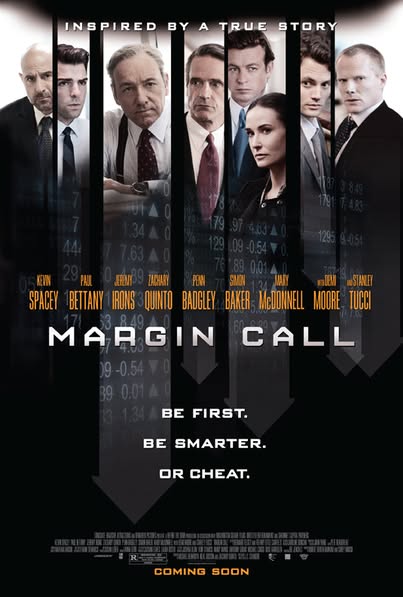Margin Call (2011)

Margin Call is a 2011 financial thriller directed by J.C. Chandor, offering a gripping and incisive look at the early stages of the 2008 financial crisis. The film features a stellar ensemble cast, including Kevin Spacey, Paul Bettany, Jeremy Irons, Zachary Quinto, and Demi Moore, and it unfolds over a tense 24-hour period at a large investment bank.
The story begins when Eric Dale (Stanley Tucci), a risk management executive, is laid off during a massive downsizing. Before leaving, he hands a flash drive to a young analyst, Peter Sullivan (Quinto), who discovers alarming data indicating that the firm is on the brink of financial collapse due to its exposure to toxic assets. Realizing the gravity of the situation, Peter alerts his superiors, leading to an emergency meeting that includes key players such as Sam Rogers (Spacey), the head of sales, and John Tuld (Irons), the firm’s enigmatic CEO.

As the night progresses, the characters grapple with the moral and ethical implications of their decisions. The film delves into the intense pressure faced by the executives as they assess their options, balancing personal and professional interests against the looming threat of financial ruin. The dialogue is sharp and meticulously crafted, reflecting the high-stakes environment of Wall Street and the complex relationships among the characters.
Chandor’s direction creates a claustrophobic atmosphere, emphasizing the urgency and tension of the situation. The film’s cinematography captures the sterile, corporate environment of the bank, contrasting with the emotional turmoil experienced by the characters. The score, composed by Nathan Larson, adds to the film’s intensity, enhancing the sense of dread and inevitability.

Margin Call explores significant themes such as greed, responsibility, and the consequences of corporate decisions. It raises questions about the ethics of financial practices and the impact of individual choices on a larger scale. The film’s portrayal of the characters’ moral dilemmas invites viewers to reflect on the human cost of the financial crisis.
Upon its release, Margin Call received critical acclaim for its intelligent script, strong performances, and thought-provoking narrative. It was nominated for several awards, including an Academy Award for Best Original Screenplay. The film has since been regarded as a timely and relevant exploration of the events leading up to the financial collapse, resonating with audiences seeking to understand the complexities of the economic landscape.

In conclusion, Margin Call is a compelling and well-crafted film that offers a gripping look at the world of finance during a pivotal moment in history. With its outstanding performances, sharp writing, and exploration of ethical dilemmas, the film serves as a poignant reminder of the fragility of the financial system and the moral responsibilities of those who operate within it. It stands as a significant contribution to the genre of financial dramas, inviting viewers to engage with the complexities of contemporary capitalism.











